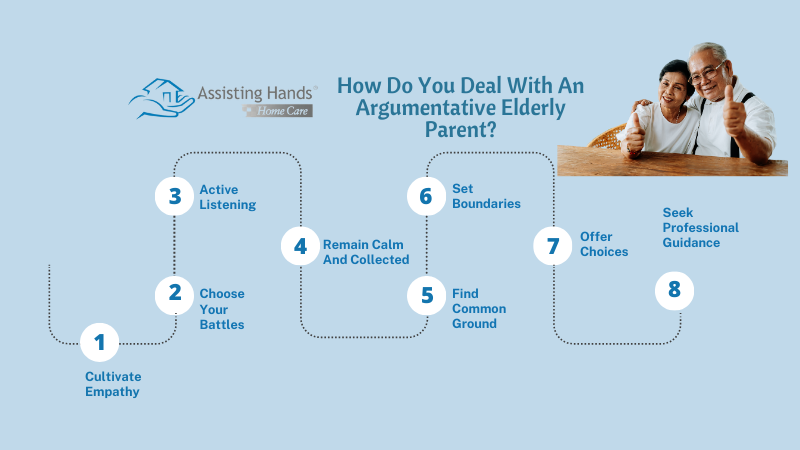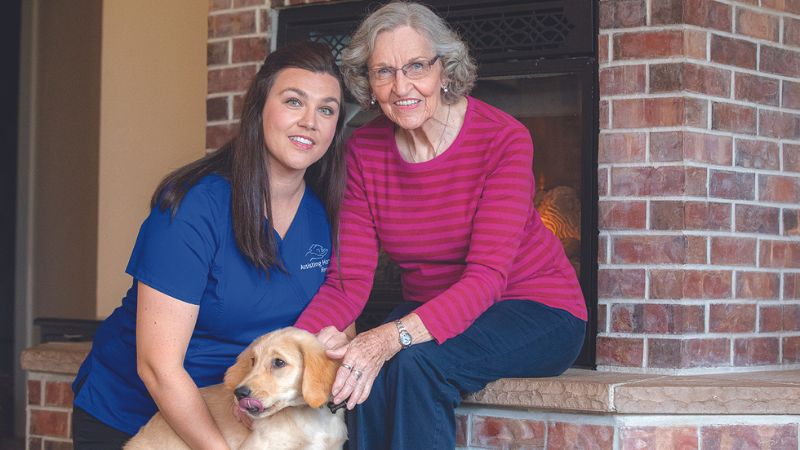As our loved ones age, it’s not uncommon to witness changes in their behavior that can be both surprising and challenging. Among the various shifts that might occur, one noteworthy transformation is the tendency for some elderly individuals to become more self-centered. In this blog, we will delve into the reasons behind this change, explore the dynamics of elderly parents acting like children, address the frustration that may arise in caregivers, and provide insights into effectively handling arguments with aging parents.

Why Do the Elderly Become Self-Centered?
As our loved ones age, we may observe changes in behavior that can sometimes be perplexing. One such transformation that caregivers and family members may grapple with is the emergence of self-centered tendencies in the elderly. Let us explore the underlying reasons behind this shift, acknowledging the complexities of aging, and offering insights to foster understanding and patience in navigating this unique aspect of caregiving. The emergence of self-centered tendencies in the elderly is a complex and multifaceted phenomenon, often rooted in the profound changes that come with aging. By understanding the evolution of priorities, recognizing the impact of loss and isolation, addressing communication challenges, and respecting the desire for autonomy, caregivers can navigate this aspect of caregiving with compassion. Embracing the unique needs of elderly individuals can lead to more meaningful connections and a positive caregiving experience for both the caregiver and the aging loved one.
The Evolution of Priorities:
The journey of aging often involves a reevaluation of priorities. As individuals face the realities of limited time and physical capabilities, a natural inclination toward self-preservation may emerge. This shift in focus from external concerns to internal well-being can sometimes be misconstrued as self-centeredness. Understanding that this change is a part of the natural evolution of priorities can help caregivers approach their loved ones with empathy, recognizing the need for self-care as a fundamental aspect of the aging process.
Preserving Autonomy and Control:
The desire for autonomy and control is fundamental to human nature. In the aging process, individuals may become more self-centered as a way to assert control over their lives. The loss of independence can be a challenging aspect of aging, and self-centered behaviors may emerge as a means of reclaiming a sense of control. Recognizing the importance of autonomy, caregivers can work collaboratively with their elderly loved ones to establish a balance between independence and support. Providing choices and involving them in decision-making processes can help alleviate the need for self-centered behaviors as a form of asserting control.

Why is my elderly mom behaving like a child?
The journey of caring for an elderly parent is a path laden with surprises, challenges, and profound moments of understanding. Among the many changes that can occur, observing an elderly mother acting like a child can be particularly perplexing. The manifestation of childlike behaviors in elderly parents is a unique thread that requires careful consideration and understanding. By recognizing the influence of cognitive changes, the need for comfort and security, the expression of grief, and the pursuit of joy, caregivers can navigate this aspect of caregiving with compassion and grace. Embracing the childlike joys can deepen the connection between generations, creating a more enriching and fulfilling journey. Let’s explore the reasons behind this intriguing behavior, shedding light on the complexities of aging and providing insights into navigating this unique aspect of caregiving.
Cognitive Changes and Regression:
One of the primary factors contributing to elderly parents adopting childlike behaviors is the spectrum of cognitive changes that accompany aging. As the brain undergoes alterations, it might result in a regression to simpler times. This regression is not an intentional choice but often a response to the challenges posed by aging, including memory loss, confusion, and a sense of vulnerability. Understanding that these childlike behaviors are a consequence of cognitive changes can foster empathy and patience among family members, enabling them to approach the situation with compassion.
Seeking Comfort and Security:
Imagine a time when the world felt safe and secure – for many elderly individuals, this reminiscence becomes a refuge in the face of the uncertainties that come with aging. Childlike behaviors, such as seeking comfort, reassurance, or engaging in repetitive actions, can be a way for elderly parents to recreate a sense of security reminiscent of their earlier years. Caregivers can play a pivotal role by creating an environment that nurtures these needs, offering comfort and reassurance without judgment. By acknowledging the emotional comfort these behaviors provide, caregivers can build a stronger connection with their elderly parents.
Loss and Grieving:
Aging often brings about losses – whether it’s the loss of friends, independence, or physical abilities. Just as a child might regress when faced with distress, elderly parents may exhibit childlike behaviors as a response to grief. Understanding that these actions are a form of expression for unspoken sorrow can guide caregivers in providing the emotional support their loved ones need. Engaging in open conversations about their feelings and creating spaces for emotional expression can help elderly parents process and navigate the complex emotions associated with aging.
Quality of Life and Enjoyment:
Childlike behaviors are not always indicative of distress; they can also be a manifestation of a desire for joy and pleasure. Engaging in simple activities, playfulness, and expressing curiosity are ways in which elderly parents may reclaim a sense of enjoyment in their lives. Encouraging and participating in activities that bring joy can enhance the quality of life for both the elderly parent and the caregiver. It allows for the creation of meaningful and joyful moments, fostering a positive caregiving experience.
Why Do I Get So Angry With My Elderly Mother?

Caring for an elderly parent can be a complex and emotionally charged journey. While it’s a responsibility born out of love and devotion, it’s not uncommon for caregivers to grapple with unexpected emotions, chief among them being anger. Acknowledging and addressing anger is a crucial step in fostering a healthier caregiver-parent relationship. By understanding the underlying causes, seeking support, and implementing effective communication strategies, one can navigate the complexities of caregiving with greater emotional resilience and compassion. Let’s together explore the underlying factors that contribute to these feelings and discuss constructive ways to manage and navigate through them.
The Strain of Caregiving:
Caring for an elderly parent often comes with an array of challenges. The physical and emotional toll of meeting their needs, coupled with the demands of daily life, can lead to stress and exhaustion. It’s essential to acknowledge that anger may surface as a response to the overwhelming nature of caregiving responsibilities.
Changing Roles and Dynamics:
As our parents age, roles within the family dynamic undergo a significant shift. The once-independent parent may become reliant on their children for support, leading to a reversal of roles. This change can be disorienting and frustrating for both parties, triggering anger as a way to cope with the discomfort of these new dynamics.
Unresolved Family Issues:
Family history and unresolved issues can resurface when caring for an elderly parent. Past conflicts, unspoken resentments, or unresolved grievances may intensify feelings of anger. Addressing these underlying issues through open communication and seeking resolution can help alleviate the emotional strain.
Loss and Grief:
Witnessing the decline of a loved one’s health or cognitive abilities is inherently painful. The grieving process begins long before the physical loss, and anger is a common stage in this journey. Understanding and accepting the grief associated with caring for an aging parent can provide clarity on the source of anger.
Personal Sacrifices:
The sacrifices involved in caregiving can lead to feelings of resentment. Putting one’s own needs and aspirations on hold for the sake of an elderly parent can evoke frustration and bitterness. It’s crucial to find a balance between caregiving responsibilities and personal well-being to prevent anger from festering.
Managing Anger:
- Self-Reflection: Take time for self-reflection to understand the root causes of your anger. Identify specific triggers and explore your emotional responses to them.
- Seek Support: Reach Out for Help: Feel empowered to seek assistance from friends, family, or qualified counselors—don’t hesitate to connect for support. Caregiver support groups can provide a valuable outlet for sharing experiences and gaining insights from others facing similar challenges.
- Set Realistic Expectations: Set realistic expectations for yourself and your elderly parents. Understand the limitations of the caregiving role and prioritize self-care to maintain emotional well-being.
- Open Communication: Establish open communication with your parents. Share your feelings, concerns, and frustrations, fostering an environment where both parties can express themselves without judgment.
How Do You Deal with an Argumentative Elderly Parent?

Caring for an elderly parent is a rewarding yet challenging responsibility, and one of the hurdles many caregivers face is dealing with an argumentative elderly parent. The dynamics between adult children and aging parents can be complex, especially when differing opinions and strong personalities collide. Here are some effective strategies for handling disagreements with an elderly parent, fostering better communication and maintaining a positive relationship.
Cultivate Empathy:
Understanding the emotional and physical challenges that come with aging is crucial when dealing with an argumentative elderly parent. Empathy forms the foundation for effective communication, allowing you to see things from their perspective and respond with patience and compassion.
Choose Your Battles:
Not every disagreement warrants a full-blown argument. Learn to distinguish between issues that require immediate attention and those that can be set aside for a later, more calm discussion. Being selective about the battles you engage in helps maintain a more harmonious relationship.
Active Listening:
Practice active listening during disagreements. Allow your parents to express their thoughts and feelings without interruption. By demonstrating that you value their perspective, you create a space for open dialogue and a more collaborative resolution.
Remain Calm and Collected:
It’s easy to get swept up in the heat of an argument, but maintaining your composure is essential. Responding with calmness and clarity sets a positive tone for the conversation and prevents the escalation of conflicts.
Find Common Ground:
Identify areas of agreement to build upon during disagreements. Establishing common ground helps create a sense of unity and fosters compromise, making it easier to navigate through differences of opinion.
Set Boundaries:
Establishing clear and respectful boundaries is crucial in any relationship, especially when dealing with an argumentative elderly parent. Clearly communicate your limits and expectations, and encourage your parents to do the same, fostering an environment of mutual respect.
Offer Choices:
Providing your parents with choices empowers them and reduces confrontations. Instead of dictating solutions, present options that align with their preferences, allowing them to feel more in control of the situation.
Seek Professional Guidance:
If conflicts persist and become increasingly challenging to manage, seeking the assistance of a professional mediator or counselor can be beneficial. A neutral third party can provide valuable insights and strategies for improving communication within the family.
Read Enabling A Fulfilling Journey: Seniors Embracing Power Of Home Care to learn more about the benefits of professional in-home care
Professional Home Care by Assisting Hands Home Care

Caring for aging parents requires a delicate balance of understanding, empathy, and patience. By exploring the reasons behind self-centeredness, childlike behaviors, and arguments in elderly parents, caregivers can develop a more compassionate approach to providing care. Remember that open communication, mutual respect, and a willingness to compromise are key elements in fostering a positive relationship with your elderly parent, even during challenging times. It’s essential to prioritize the well-being of both the elderly individual and the caregiver to foster a positive and supportive environment for everyone involved in the caregiving journey.
Assisting Hands provides professional home care and companion care services in Fort Lee, Edgewater, Hoboken, Lyndhurst, Cliffside Park, NJ, and nearby areas for elderly individuals requiring continuous supervision. Our professional live-in caregivers are trained and licensed to offer seniors high-quality home care services. Our services include assistance with personal care, meal preparation, light housekeeping, and other activities. Call us today for a free in-home consultation at (551) 239-8651.

Abhi Mitra founded Assisting Hands Hudson County after recognizing the significant value of personalized and excellent care through family experience, specifically in caring for his grandmother. His expertise in program management, along with a genuine desire to make a positive difference in people’s lives, motivates him to provide the same level of care that his grandmother received. He obtained an MS degree from Pace University, New York, and a Certificate of Executive Healthcare leadership from Cornell University, Ithaka, NY. Abhi efficiently manages tasks with kindness and intelligence, ensuring everyone feels comfortable and welcome. He excels in problem-solving and puzzles while maintaining smooth operations at the agency and ensuring everyone receives high-quality individualized care. His dedication to his work and compassionate nature greatly improves the quality of life for the seniors under his care, providing them with a comfortable and joyful environment. Abhi ensures the highest possible quality, providing reassurance to everyone. His dedication and caring nature contribute to creating a comfortable and joyful environment for those he assists. He enjoys biking, taking walks, and watching cricket with his family and friends.










